News
Double whammy for Ahmadi refugees fleeing persecution, as UN agency closes Colombo office
View(s):By S. Rubatheesan
Hundreds of foreign refugees and asylum seekers are facing an uncertain future in Sri Lanka as the local UN refugee agency representation office in Colombo plans to wind up its operations by the end of this year.
As Sri Lanka marked the 75th freedom day on February 4, Rizwan Akram Hanjra from Fort Abbas in Pakistan’s Punjab province thought he was breathing the air of freedom when he landed at Bandaranaike International Airport (BIA) with his family of eight, including five children.
Mr. Hanjra said he decided to abandon his motor spare parts business and flee Pakistan when he received death threats from extremist groups who were targeting members of the Ahmadiyya movement, a sect ostracized by the mainstream Muslim community. Mr. Hanjra and his family belong to the Ahmadiyya sect. Mainstream Muslim scholars have declared the sect un-Islamic and condemned the sect followers’ belief that Ahmadiyya founder Mirza Gulam Ahmad was a prophet.
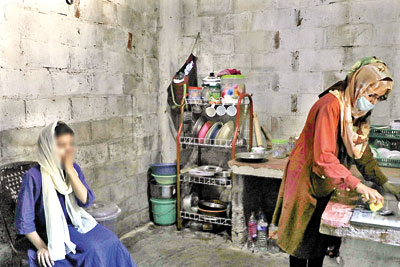
A partially built house with poor facilities that an Ahmadi family rented in Negombo. Pix by M.A. Pushpa Kumara
Since the early 1970s, Ahmadis have been subjected to persecution on religious grounds in Pakistan and forced to practise their religion privately.
He told the Sunday Times that once he had been attacked mercilessly by the extremists when he went to pick up his children from school. After this incident, the international school where his children were studying closed the door to them.
“I came here after selling all of our properties — the shop, land and my father’s livestock so that I can live with my family peacefully without fearing for our lives. But survival here has become increasingly difficult,” Mr. Hanjra said, explaining that he is supporting his family with the little money he raised and the support from charities.
He said his main worry was he was unable to give his children a school education. His wife Fouzia Talat, an M.A. graduate in English literature, is homeschooling them.
In Sri Lanka, refugees are barred from engaging in work or admitting their children to local schools since Sri Lanka has not ratified the 1951 UN Convention relating to the Status of Refugees. However, asylum-seekers and refugees are allowed to access free healthcare in state hospitals.
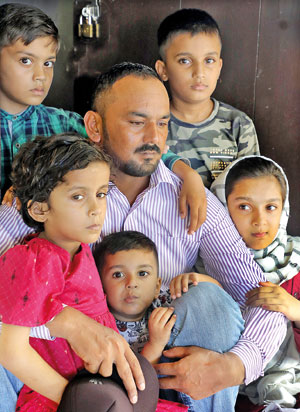
Rizwan Akram Hanjra and family
The news of the eventual closure of the United Nations High Commission for Refugees (UNHCR) office in Colombo came as a shock to many refugees, some of whom are waiting for more than ten years with hopes that their refugee status applications to Western host countries will be entertained. The closure of the office means no more livelihood assistance from December 31 onwards.
“At least, the UN office should fast-track our cases and ensure our safety in some other country. They cannot just abandon us,” said Mr. Hanjra, whose application is still under consideration at the UNHRC office.
Ata Ul-Mainan, of Nankana Sahib District in Pakistan’s Punjab province, left his family, including five children, behind when he faced a threat to his life.
He claimed that his social work in the community and involvement in the local Ahmadi mosque affairs made him a noted individual. “I was not able to finance the trip for my whole family. So only I left the country after raising money by selling my land. I hoped my family could join me once I reached a safe place. But now, I don’t know when that will happen since my appeal has been pending for years,” said Mr. Mainan, whom we met at an Ahmadi mosque in Negombo.
“My sister in Pakistan helps me financially to cover my expenses occasionally but in Pakistan, the economic situation is worse than here. I cannot depend on her for a long time,” he said.
Like Mr. Hanjra and Mr. Mainan, dozens of Pakistani-origin Ahmadis are anxiously waiting for a positive response from the UNHCR office but the UNHRC’s decision to abandon them and close its Colombo office has plunged them into uncertainty.
As of February 28, at least 845 asylum seekers and refugees from Pakistan, Afghanistan, Myanmar, and Iran are in the country awaiting a response to their asylum applications and appeals to settle down in a third country. The number was 1,253 in November 2020.
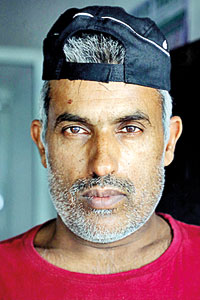
Ata Ul- Mainan
On May 23, a group of foreign refugees and asylum seekers, including children, staged a protest outside the UNHCR office in Colombo, urging the UN agency to fast-track their applications and provide a speedy solution to their plight before the closure of the office.
Ruki Fernando, a human rights activist who works closely with the refugee community said that irrespective of where these refugees had come from, the UNHRC had a big responsibility to ensure their safety. “The UN agency should ensure a permanent settlement before the closure of the office. Many lives are in limbo, particularly refugee children.”
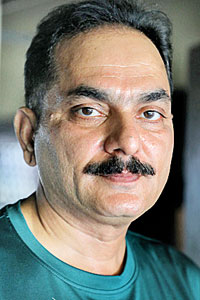
Sirshar Ahmed
Sri Lanka’s ongoing economic crisis which saw the cost of living skyrocketing coupled with high inflation has come as a double whammy for the refugees who are barely surviving with support from charities and donations, besides livelihood assistance given by the UNHCR.
With no state mechanism in place to process refugees and asylum seekers, the UNHCR’s Colombo office handles registration, refugee status determination, documentation, and counseling.
A fact sheet issued by the UN agency in 2020 noted that advocacy opportunities were limited due to the scrutiny of the then-new government on all refugee-related issues, persistent concerns regarding the possibility of shrinking asylum space and large-scale refoulement of Persons of Concern (PoCs) and the COVID-19 crisis.
Therefore, the UN Agency’s Colombo office only facilitates resettlement to a third country as a solution.
Among those whose asylum applications are pending over the years, many faced persecution due to inter-caste marriages or conversion to the Ahmadi sect from the majority Sunni sect. Those families who faced threats from close relatives and family members back home alleged their asylum applications are dragging on for years since their applications are considered “special cases”.
Sirshar Ahmed, 47, arrived in Sri Lanka with his family of five, including three children, in 2019, months after the Easter Sunday bombings that took 247 lives and injured 407 persons.
“There were two options for me — either saving my family or my business. I chose my family. Even my close family members and relatives do not consider us Muslims,” said Mr. Ahmed, who converted to Ahmadiyya after he married an Ahamdi woman some ten years ago.
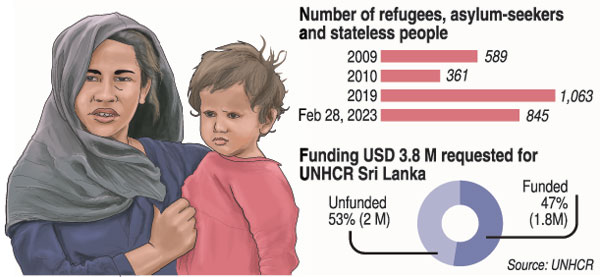
“My children are not receiving the education they deserved in their formative years as we have been stuck here over the last four years. The UNHCR office should provide us with a permanent solution. We cannot go on like this forever,” said Mr. Ahmed, who ran a construction business back home and later sold everything to flee the country.
Meanwhile, responding to a questionnaire sent by the Sunday Times, the UNHCR office in Colombo said that UNHCR is aware of refugee concerns and continues to engage to address these issues. “We urge peaceful dialogue to address all concerns linked with refugees, asylum seeker protection and welfare.”
| UNHCR to end Lanka operations end of this year | |
| The Sri Lanka office of the United Nations High Commissioner for Refugees (UNHCR) is set to wind up its operations by the end of this year as a majority of Internally Displaced People (IDPs) have been resettled following the end of the war in 2009. However, the decision came as a shock to some 845 foreign refugees and asylum seekers in the country as their asylum applications and appeals are still under consideration through the UN agency to obtain shelter in a third country. “With the wide-scale displacement situation in Sri Lanka over and the majority of internally displaced people returning to their places of origin, we are now able to review our presence in the country,” the UNHCR office told the Sunday Times in an email response. |
The best way to say that you found the home of your dreams is by finding it on Hitad.lk. We have listings for apartments for sale or rent in Sri Lanka, no matter what locale you're looking for! Whether you live in Colombo, Galle, Kandy, Matara, Jaffna and more - we've got them all!

